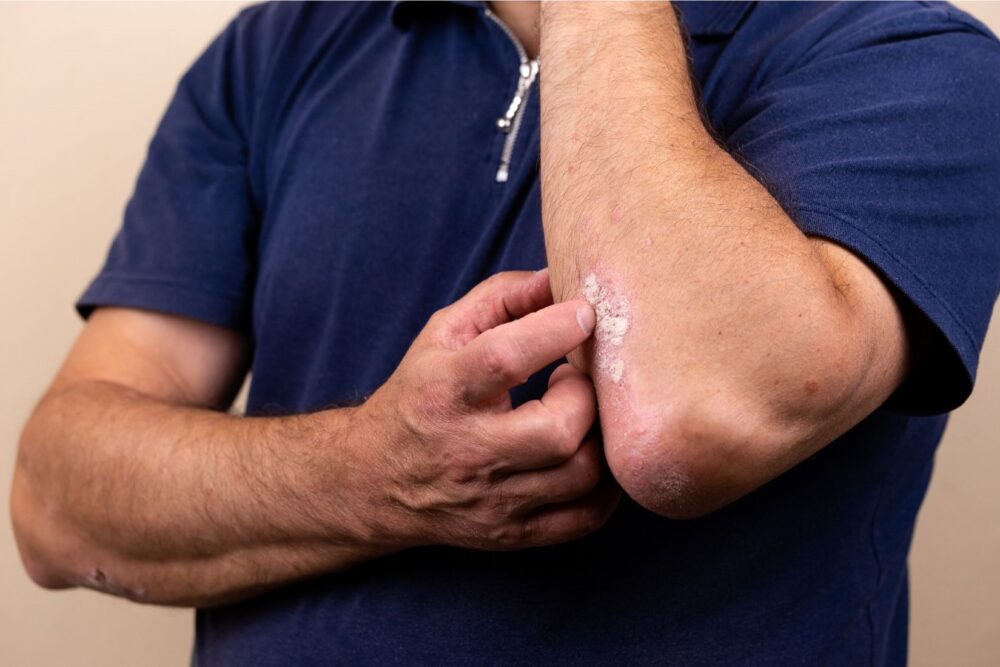If you’ve ever noticed raised, scaly patches on your skin that seem to appear out of nowhere, and don’t respond to your go-to creams, you might be dealing with psoriasis. This chronic autoimmune condition is more than just a “rash.” It’s often misunderstood, occasionally stigmatized, and can be both physically and emotionally draining. But knowledge is power, and once you understand what’s happening beneath the surface, managing psoriasis becomes a lot more doable.
What Is Psoriasis?
Psoriasis is a chronic, inflammatory skin disorder that causes the body to speed up the skin cell life cycle. Instead of skin cells shedding gradually, they build up on the surface in days, leading to thick, red plaques with silvery scales. It’s not contagious, but it is complex, often tied to immune system dysfunction and genetic predisposition. While it most commonly appears on the scalp, elbows, knees, and lower back, psoriasis can show up anywhere, including nails and joints.
What Triggers a Flare?
Psoriasis can be unpredictable, but several known triggers tend to provoke or worsen outbreaks:
- Immune System Dysfunction: Psoriasis is an autoimmune condition, meaning your body mistakenly attacks healthy skin cells.
- Genetics: If psoriasis runs in your family, you’re more likely to develop it.
- Stress: Emotional or physical stress is one of the most common flare triggers.
- Infections: Illnesses like strep throat can activate or worsen psoriasis, especially in children.
- Skin Injuries: Even a minor cut, scrape, or sunburn can cause a flare (this is called the Koebner phenomenon).
- Cold Weather: Dry air and less sunlight can lead to more flare-ups.
- Certain Medications: Some beta-blockers, lithium, or anti-malarial drugs can exacerbate symptoms.
Managing Psoriasis at Home
While there’s no cure for psoriasis, consistent care can go a long way in minimizing discomfort and keeping symptoms in check.
- Hydration is Key: Use thick, fragrance-free moisturizers to keep skin hydrated and reduce scaling.
- Warm (Not Hot) Baths: Soaking in a lukewarm bath with Epsom salts or colloidal oatmeal may help loosen plaques and soothe itching.
- Use Medicated Creams: Over-the-counter products with salicylic acid or coal tar can help reduce scaling and inflammation.
- Sunlight Can Help: Short, safe bursts of sunlight may help calm the immune response, but don’t overdo it and always avoid burning.
- Stress Reduction: Techniques like deep breathing, yoga, or light exercise can help reduce flare frequency.
- Avoid Harsh Products: Stick to gentle cleansers and avoid anything with strong fragrances or alcohol.
When to See a Dermatologist
If your psoriasis is interfering with daily life, spreading rapidly, or causing joint pain (a sign of psoriatic arthritis), it’s time to take things further.
At Skin and Cancer Center of Arizona, we can provide:
- A clear diagnosis (there are several types of psoriasis, and treatment varies)
- Prescription-strength topical treatments
- Oral or injectable medications (including biologics)
- Guidance on how to manage lifestyle triggers and prevent flares
There’s no one-size-fits-all solution, but with the right plan, psoriasis can be controlled, and your skin (and confidence) can thrive.
Let’s Stay Connected
Want to stay ahead of your skin concerns? Follow us on Instagram and Facebook for expert tips, promos, and real-life solutions for chronic conditions like psoriasis. And if you’re feeling overwhelmed, just know you’re not alone in this. We’re here to walk with you through flare-ups, healing, and everything in between. For more information on skin health and prevention tips, visit the American Academy of Dermatology (AAD).





